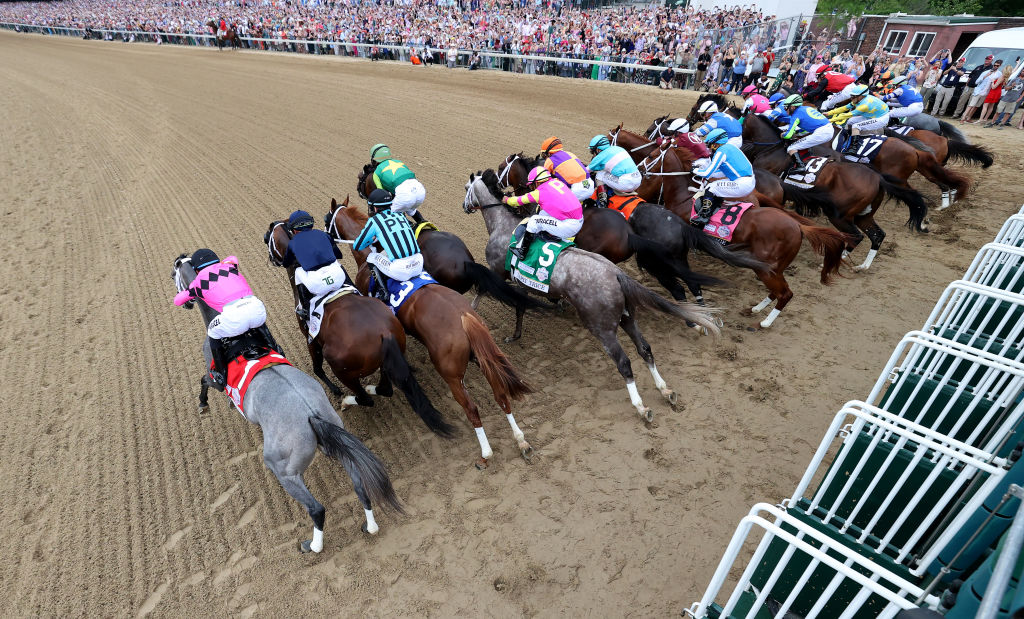Should horse racing be banned?
A slew of recent deaths among horses has reignited questions over the sport's ethics


A free daily email with the biggest news stories of the day – and the best features from TheWeek.com
You are now subscribed
Your newsletter sign-up was successful
One of the longest-running traditions in sports is here again: Horse racing's Triple Crown has begun, and a three-year-old colt, Mage, has won its first leg, the Kentucky Derby. Despite the pageantry and ceremony of the Derby, though, the 149th "Run for the Roses" was overshadowed by a series of horse deaths at the site of the race, Churchill Downs in Louisville.
Seven horses died in the week leading up to the Derby. At least four of them were euthanized after sustaining injuries, including one who broke his neck before a race, industry outlet Daily Racing Form reports. Two of these horses were euthanized on the day of the Derby itself after suffering irrecoverable injuries, their trainers told The Associated Press. Another trainer was also suspended indefinitely after two of his horses died under mysterious circumstances.
Following these deaths, there have been renewed calls for better safety regulations when it comes to horse racing. While Churchill Downs has said it is actively investigating these deaths, the recent events have caused a longstanding debate to creep back up: Should horse racing even be legal? Protesters have long spoken against the sport, The New Yorker reported in 2021, and PETA describes racehorses as "victims of a multibillion-dollar industry that is rife with drug abuse, injuries, and race fixing." But do these recent deaths actually prove that it's time to shutter the racetracks?
The Week
Escape your echo chamber. Get the facts behind the news, plus analysis from multiple perspectives.

Sign up for The Week's Free Newsletters
From our morning news briefing to a weekly Good News Newsletter, get the best of The Week delivered directly to your inbox.
From our morning news briefing to a weekly Good News Newsletter, get the best of The Week delivered directly to your inbox.
What are commentators saying?
Both Churchill Downs and the newly created Horseracing Integrity and Safety Authority have said the issues are not indicative of a pattern, and that the last two horses to die had previously passed inspection. However, "Do the math. Seven horses dead. It doesn't add up," Joe Drape writes for The New York Times. Many of the issues in the sport can be traced to the fact that American horse racing "has long admitted that it has a culture of drugs and lax regulation and a far higher rate of horses breaking down and being euthanized than most other places in the world," Drape adds. He notes that this has been a known problem since the 1990s, when horse breeder Arthur Hancock III said that "too many horses were running on performance-enhancing drugs or were so doped up on anti-inflammatories and painkillers that they were running unnaturally fast and hurting themselves, often fatally."
Even though horse racing is known to be a dangerous venture for these animals, the sport has continued because "the last remaining thrill in horse racing, for folks with a lot of money to burn, became the all-or-nothing bid to win a glamor race or two — then retire the animal swiftly to a lifetime of highly paid breeding," David von Drehle opines for The Washington Post. Despite this, though, von Drehle notes that the gambling aspect of the game has been shrinking as "Americans have drifted away from rural pastimes and gained more options for gambling their money away."
Even people who have vested interests in the industry admit that there is at least one aspect of racing that should be put to pasture — whipping. While the use of riding crops by jockeys remains standard (though often regulated), "whipping a horse conveys a terrible image of the sport to the general public," Bill Finley writes for horse racing website Thoroughbred Daily News. Finley adds that in order to help clean up the game, officials could "ban whipping tomorrow and the sport will get along just fine and its image will improve."
What's next?
Despite the controversies, "racing will never be banned — there is too much money to be made from it, particularly as gambling becomes easier across the U.S.," Elizabeth Banicki writes for The Guardian. She also believes that while the sport could be outlawed, "there's the money and the fashion and the mint juleps to think about. The message is clear: 'We don't care.'"
A free daily email with the biggest news stories of the day – and the best features from TheWeek.com
"There is no other mainstream sport where carnage and indifference occur so regularly — and are as tolerated," Banicki says. "These horses were doing what was demanded of them and they still suffered and died."
However, the implementation of regulatory bodies within racing, as well as recently enforced safety rules and pushes for safer practices, could help clean up a sport continually marred by scandal. The new rules were enacted after Congress passed an anti-doping law in the sport, and given the recent deaths at Churchill Downs, additional regulations could be on the horizon. A complete ban, though, seems improbable.
Justin Klawans has worked as a staff writer at The Week since 2022. He began his career covering local news before joining Newsweek as a breaking news reporter, where he wrote about politics, national and global affairs, business, crime, sports, film, television and other news. Justin has also freelanced for outlets including Collider and United Press International.
